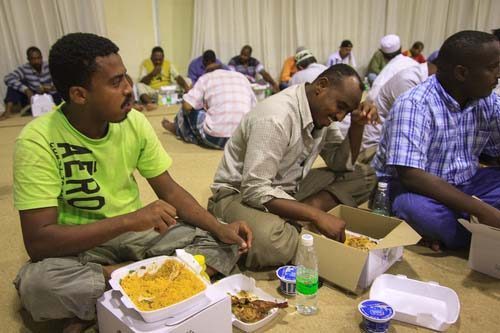
In Qatar, it is pretty easy to make Ramadan all about the food. Supermarkets are almost the only thing open during the day, and at night restaurants and hotels woo us with lavish buffets with cuisine from nearly every country in the world.
Having spent my whole life in Qatar, and watching it grow up as I’ve grown up, I resolved a few years back to broaden my Ramadan perspective.
To help me remember that this is a month of fasting and worship where everyone is equal before the Almighty, I’ve been spending the first week of the fasting month visiting iftar tents set up largely for low-income expats around the city.
These visits have given me an opportunity to connect with a variety of people from different walks of life as we all gather in a hall to sit and break the fast.
Not dejected
This year, I visited three different tents across Doha, making new friends and sharing wonderful thoughts. During my interaction with the fellow Muslims around me, I got to learn what they do, how they feel about being in Qatar and their primary motivations for being here – including to support their families back home.
Interestingly, despite being constantly categorized as such, they don’t view themselves as poor, dejected laborers. Most of them told me they are very happy with the jobs that they have here and the salary they are paid. One said it was life changing for him to get a chance to leave his country (Nepal) and move to a place like Qatar.
Iftar tents, usually sponsored by local charities or the government, are very different from the Ramadan tents most of us are used to, the ones at Qatar’s five-star hotels. For one, the food at these tents is free. And all are invited to attend and eat (though the crowd is typically male).
Around sunset each day, everyone sits on the floor as iftar is served either in special boxes or people sit in groups to share food that is served on large platters. Some tents cater differently, offering dining tables and chairs.
The food is usually pretty simple but delicious, consisting of dates, fresh fruits, bottles of juice and laban, haleem and machboos. I shared my plate of machboos in one of the Aziziya tents with four other people. They were quite surprised to learn about me and asked why was I having iftar with them as they rarely get a chance to mingle with someone who isn’t a co-worker.
Ghaffar, a carpenter at a local construction company said, “I am very happy that the charities and government have set up these iftar tents for us, which not only provide us with a healthy iftar, but become a source to connect with different people.”
Compared to the posh, formal atmosphere of a hotel, eating at an iftar tent is a totally different experience, and there is an amazing communal vibe amongst everyone.
In addition to being government-funded, these tents are also run by locals in certain areas of Doha and might be catered differently. Some locals are very kind and send iftar to their neighbors throughout the month.
I recommend anyone who can to spend a few days this month visiting these tents, where you will not only get to meet and greet new people, and it doesn’t hurt to offer an extra hand in setting up the iftar.
Adopting this routine every Ramadan could be a great way to give something back to the people and community who are helping us build the country’s future.
Thoughts?
Credit: Photos by Omar Chatriwala
